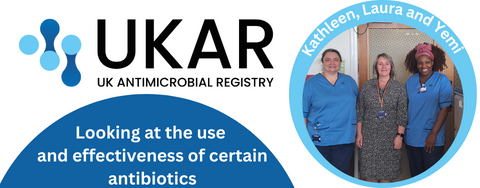NHS Grampian is one of the pilot sites taking part in the UK Antimicrobial Registry (UKAR) Study. The UKAR Study is a collaboration between the Epidemiology Group of the University of Aberdeen, the British Society of Antimicrobial Chemotherapy (BSAC), and hospitals across the UK.
The UKAR Study will look at antibiotics designed to treat infections that are becoming harder and harder to treat, such as MRSA [1]. Data [2] suggest that people with an MRSA infection are more likely to die than people with infections that can be treated with antibiotics. One of the drugs included in the UKAR study, Ceftaroline, can be used to treat MRSA infections. Ceftaroline and the 10 other antibiotics in the UKAR Study are the last line of defence against antibiotic-resistant bacteria. It is important that we understand where and when these antibiotics need to be used. And to track whether bacteria are becoming resistant to them. The aim of the UKAR Study is to look at why these drugs are being used and how effective the drugs are at treating infections.
Dr Noha El Sakka OBE, head of Microbiology and Virology at NHS Grampian, is the Principal Investigator on the UKAR Study at the Aberdeen Royal Infirmary. Dr El Sakka had this to say about why it was so important for NHS Grampian to take part in the study,
“Antimicrobial resistance represents a global challenge. The need for new antimicrobial agents is becoming more and more important. The UKAR study is an exciting project. It will help shed light on the available new antimicrobial agents, and the clinical value of their use. This is much needed information. Data from the study is going to help shape the strategy for management of infection in the future.”
If you would like to learn more about the study, and the current list of eligible antibiotics please visit the study website UK Antimicrobial Registry or email the study team ukar@abdn.ac.uk
[1] MRSA - NHS (www.nhs.uk)
[2] https://www.who.int/news-room/fact-sheets/detail/antimicrobial-resistance
